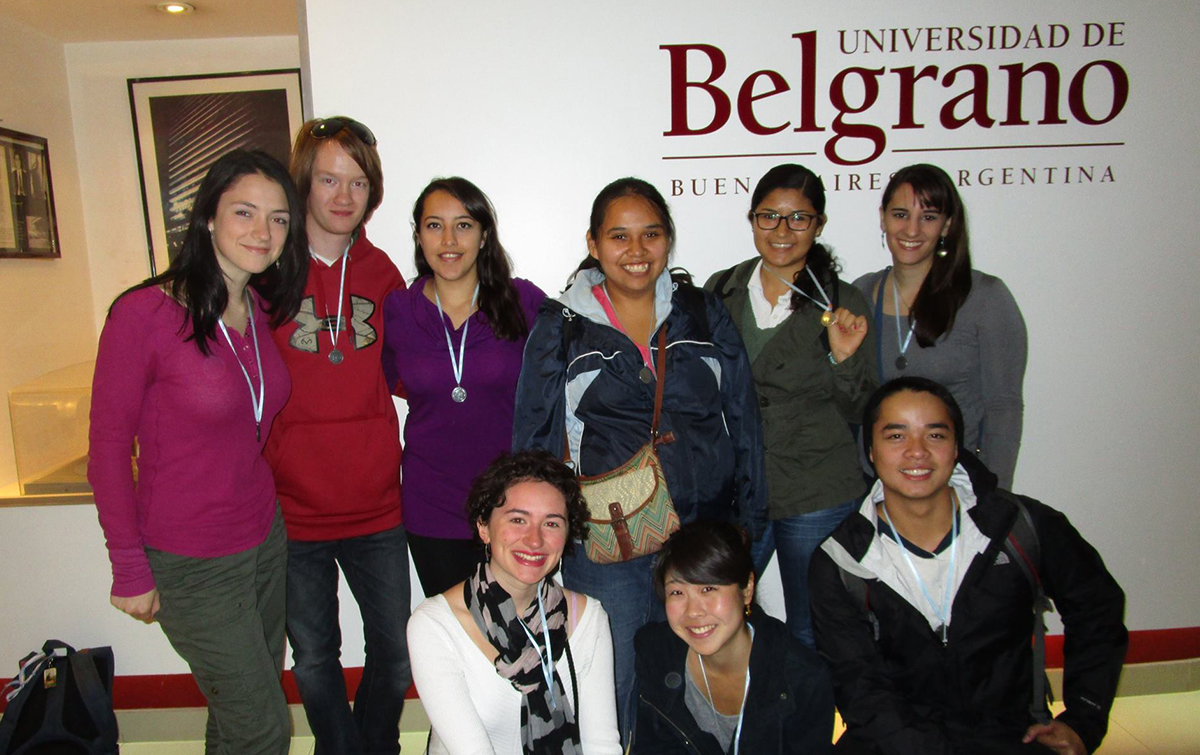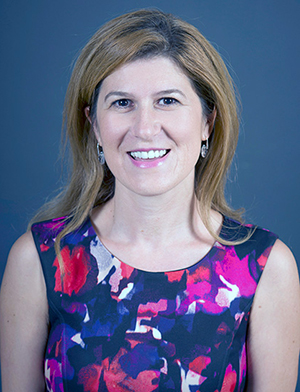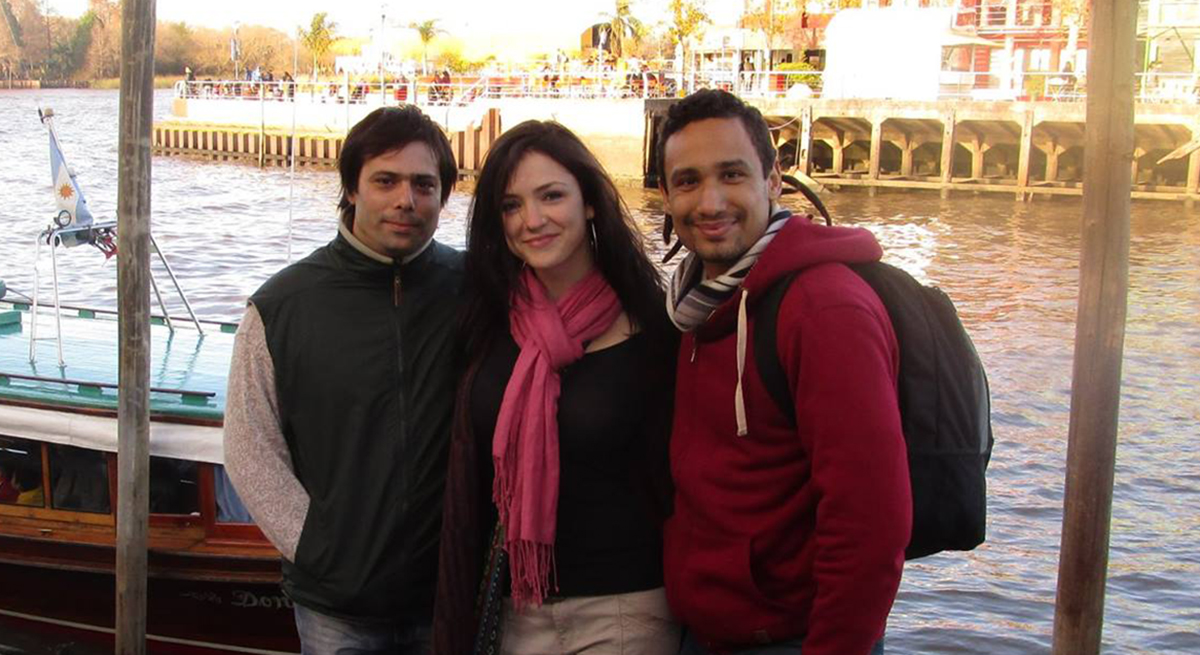Speak the Language
Study of modern languages opens many doors for students

Tirzah Riddle, ba ’15 (top row, left), poses with other international students at Universidad de Belgrano in Buenos Aires, Argentina. Photo submitted
From The Ichabod - Fall 2023
By Angela Lutz
The first time Tirzah Riddle, ba ’15, went to Paraguay for six months, she had a transformative experience. A Washburn University student at the time, Riddle had grown up in Topeka and never taken public transportation or been away from her mom for more than two weeks. But soon she was living and studying in a region where almost no one spoke English. As an aspiring interpreter and translator, that’s exactly what she was hoping for.
“I had been studying Spanish since high school, but I knew I wouldn’t get to the level I needed to be a linguist if I didn’t study abroad and become immersed in the language,” Riddle said. “I needed to become fluent. But first I had to get over the culture shock, and it was scary at the beginning.”
When Riddle returned home, she felt empowered. She found studying abroad so personally and intellectually fulfilling that she decided to do it again in Argentina. All of her dedication paid off professionally – today she is working her dream job as an interpreter, both as an independent contractor through the Jackson County, Missouri, courthouse and through an agency called Bridging the Gap Interpreting. Without her time in South America, she doesn’t feel she would be the person she is today.
“You become more independent and realize there are no limits. If you put your mind to something, you can do anything,” Riddle said. “I think the initial struggle makes you a more well-rounded individual. You have to try to communicate, and your personality is suppressed for months until you have the vocabulary. I felt like I came back a completely different person.”
Many foreign language students have stories like Riddle’s. As professor and chair of the modern languages department, Miguel Gonzalez-Abellas, who is originally from Spain, has seen the positive impact on many students’ lives in his 27 years teaching Spanish at Washburn. As the business world becomes more global, Gonzalez-Abellas points out that being multilingual creates unparalleled opportunities for communication and understanding.
“There are a lot of soft skills students can use in whatever career path they decide to take,” he said. “You develop empathy. When you know the language and you have access to the culture, you develop an appreciation and respect for the people. It helps with critical thinking, and it helps you to express yourself. It also helps you gain better knowledge of your own language.”
For Prof. Courtney Sullivan, enhanced career opportunities are just one benefit of studying a foreign language. Sullivan has been teaching French at Washburn since 2003 and has watched several students blossom and grow after learning about different languages and cultures and making the decision to travel or study abroad.
“It sets off a spark,” she said. “On the last trip I co-led to Paris, students were able to get around the city and enjoy communicating. It enriched their lives and will help them personally and professionally in the future. It’s also rewarding when students go abroad for a semester or a year and come back excited and speaking French really well.”
 Personal enrichment was certainly a benefit for Ingrid Bego, ba ’03, who is originally from Albania and now works at Western Carolina University as an associate professor of political science and director of the international studies program. She came to the Midwest as part of a study abroad program and chose to attend Washburn because it was close to her host family in McPherson, Kansas. She believes her studies in political science, German and Spanish have enhanced her appreciation of different cultures and communities.
Personal enrichment was certainly a benefit for Ingrid Bego, ba ’03, who is originally from Albania and now works at Western Carolina University as an associate professor of political science and director of the international studies program. She came to the Midwest as part of a study abroad program and chose to attend Washburn because it was close to her host family in McPherson, Kansas. She believes her studies in political science, German and Spanish have enhanced her appreciation of different cultures and communities.
“For me, it’s been fundamental to who I am as a professional and as a person, and now I’m helping other students study abroad,” Bego said. “I imagined Washburn would be like a family and it was very much like a family. When I think of home in the United States, Washburn and Kansas are places I go back to.”
Riddle also found personal value by studying Spanish and embracing new cultures. Without the exposures she gained through Washburn, she would not have been able to fulfill her passions for language, people and learning by working as an interpreter.

(Tirzah Riddle [center] poses with friends she made in Buenos Aires Province, Argentina. Photo submitted)
“Washburn was the greatest time of my life,” Riddle said. “The modern language department was the best, and the professors were amazing. Speaking another language will help you no matter the job you have, and it also helps you in everyday interactions with people.”
Gonzalez-Abellas and Sullivan say these types of life-changing experiences – along with small class sizes and personal attention from professors and mentors – make Washburn’s foreign language department stand out from other schools.
“It’s a great feeling when you know you’re a little part of your students’ success,” Gonzalez-Abellas said. “Every language has a value.”